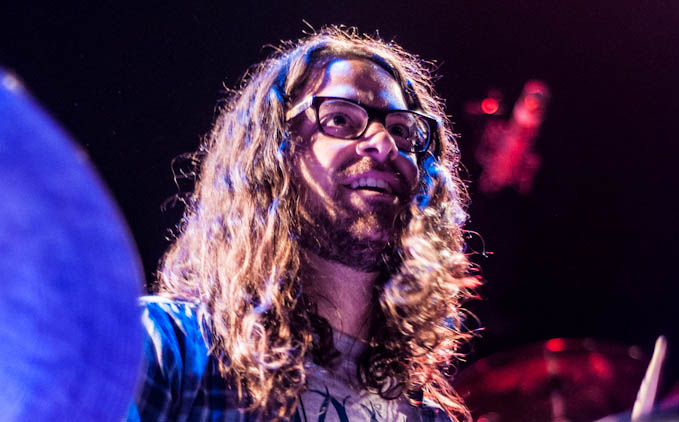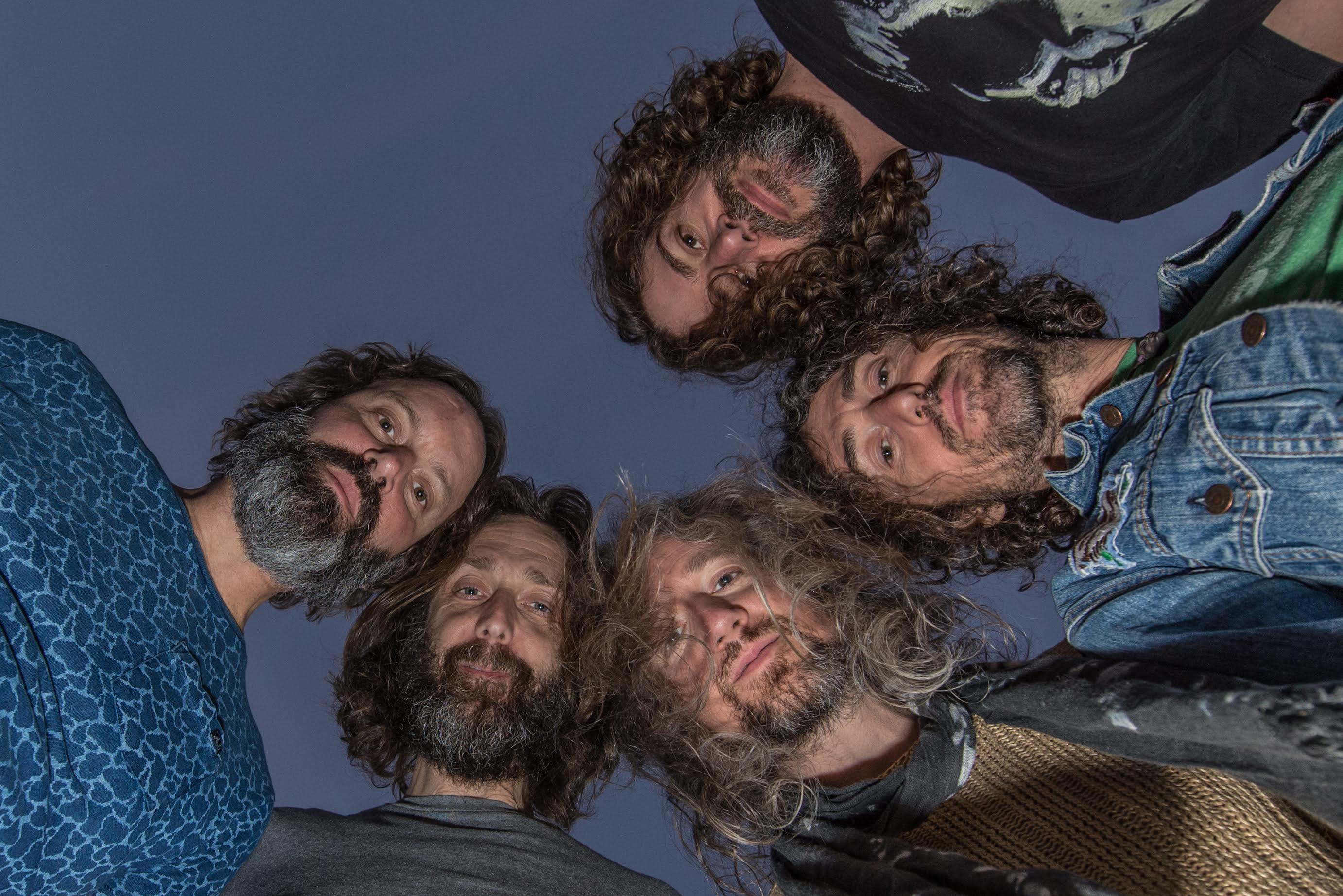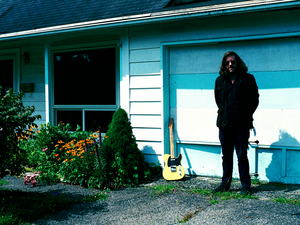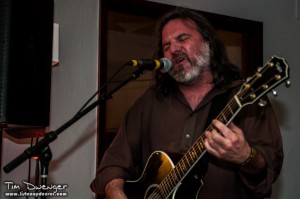 Photo by Kit Chalberg
Photo by Kit Chalberg
From “The Heart of Colfax” to the courtrooms of New York City, singer/songwriter Andy Palmer has witnessed harsh realities and hidden truths, and pondered on them with the mind of a monk. He started down his musical path in high school, but took time to explore life, taking alternate roads that lead him farther away from music. Eventually music became his main focus again, simply because he had no other way to express himself. A few years back on the full time music saddle, Palmer has just released his second full length album, Hazard of the Die. The album has been extremely well received, and it’s powerful presence can be attributed to the unique experiences Palmer has amassed, and the perspective that was created as a result.
When Palmer left school and put music on the back burner, he did it with the goal of understanding himself on a deeper level. His intent was not to further his music career as a result of that understanding; he simply wanted to be alone with Andy for a bit. Palmer retreated to his birth state of Maine for some seclusion. Alone in a yurt devoid of creature comforts, yet filled with swirling thoughts, Palmer settled his mind through meditation for six months. While not in a meditative state, Palmer dug deep, pondered his place in the world, and put paper to pen. “I spent a lot of time in the woods alone and being introspective,” said Palmer in a recent interview with Listen Up Denver!. “It certainly translated into things I was writing about at the time. I wrote ‘When History’s Done’ and ‘I Died Today,’ (From Palmer’s debut album Sometime Around) those songs that have a lot self exploration and a relationship with being in the woods. I was trying to find some importance in the very little things around us and bring them into songs.” Palmer’s time in the yurt changed him forever, and is a cornerstone in the foundation his career is built upon. “When in the yurt, music and meditation was all I had. That time was a while back now, but its impact was huge both artistically and generally. Living alone in the woods for 6 months – hiking in food and 5 or 10 gallon water buckets on a sleigh, no electricity, intentionally cutting off the world – is fucking hard. I’m pretty sure I went a little crazy toward the end of it. But during the time, to busy myself, all I had were books, my guitar and my voice – and yurts are round so the acoustics were kick ass! For 6 months and with zero other input, I was on an endless cycle between those distractions – those and the woods itself. So, I played and sang a shit-ton. It remains a little unclear to me how exactly that period impacted my lyrical or songwriting approach. All I really know is that I place a high value on doing and saying whatever comes truly from within and is devoid of outside influence or expectation.” Once Palmer felt he had a firm grasp on his thoughts and his identity, he placed his grip on an oar next.
After being a yurt dwelling monk of sorts, Palmer took his new connection to self and sought a connection to nature. Palmer moved back to Colorado and became a raft guide and immersed himself in the rushing waters. His mind now focused outward he soaked in the beauty of every detail around him. Palmer wrote while in the yurt, but on the riverside he explored the fretboard of his guitar. “I wasn’t actually writing a lot during that time, but it certainly helped to develop my acoustic guitar playing style because it was just freewheelin’ around the campfire.”
Now that Palmer’s eyes were trained to see the beauty in everything, and his mind trained to see the reality of self, his next step was to seek more knowledge. With no intention of ever being in a courtroom, but simply to learn, Palmer accepted a scholarship to law school. Upon graduating, Palmer moved to Brooklyn, New York and became a Public Defender and set his eyes on totally new surroundings. Palmer had worked on his music during his previous endeavors, but being an attorney left no room for creation. “I didn’t write a lick while in law school or while practicing law for the first 2 years. I had no time and every ounce of my energy was directed toward not dropping out of law school. Then, practicing law in Brooklyn was all ‘new place, new job, new friends, big city shit,’ and music didn’t crop up its head till my last year when moving on and questioning what the hell I was doing began again. I knew all along that I wasn’t cut from the same cloth as most of my colleagues. I knew I was not on ‘my path’ as some might say. While lawyering, music was a minimum.”
While music may have escaped him during his attorney days, Palmer got flooded with experience and those experiences led him right back to the music. When Palmer started playing during his undergrad days he was a totally different man, but he was a musician. That never left him and when he went looking to express and process the experience he gained in the woods, on the river, or in the trenches of Brooklyns courtrooms, he picked up his guitar and started writing the soundtrack to the next chapter of his life.
Palmer’s return to music quickly yielded his first full length album Sometime Around, which introduced the world to his distinct gritty Folk. Performing felt much different than the earlier days for Palmer as he started sharing Sometime Around with audiences around the country. Although his time in the courtroom didn’t leave him much time to write or play guitar, he did stand in front of lots of crowds, and learned something that impacted his musical career profoundly. “I have never been good at pretending to be someone I’m not. Many litigators believe that to stand in front of a jury, story tell, convince and persuade, the attorney should change themselves — make themselves more likable or even generic so as not to offend. For me, I did none of that. I chose to become more of myself and to let me personality come through. Litigating was the first time that I had taken a chance and let me be seen feeling strongly about something. I assumed a dramatic roll — crouching down to the floor in demonstration or letting emotions surface, boil and bubble over — and I learned that in releasing these pieces of myself, people didn’t recoil or judge in ways I’d assumed they would. Instead, they actually listened. Being in the courtroom taught me that I didn’t have to perform so much, I should prepare to all hell and let myself go — being earnest, honest and forceful while still fallible.”
After Sometime Around, Palmer quickly reentered the studio with new material and recorded On The Road To Crazy, a three song EP that showed Palmer’s talents were growing rapidly as he settled back into a life of music again. Palmer’s latest effort Hazard of the Die, shows that this man is barreling down the tracks when it comes to his musical journey. He approached the album with fervor and took himself out of his comfort zone both stylistically and geographically. True to his “see where the road may take me” style, he wound up recording Hazard of the Die without necessarily looking to record an album. Palmer had material he had been working on, but in his eyes it was rough. Just looking to make connections and hone his craft, Palmer reached out to LA based producer Warren Huart (The Fray, Aerosmith, Matisyahu). Huart was accepting applications from musicians through the artist development site SonicBids and Palmer’s application is the one that stood out. “From what I hear from him he gets hundreds and hundreds of applications to work with him.” Although it was an obvious distinction to work with Huart, Palmer still had reservations. “Eventually, I decided to pull the trigger but I was definitely hesitant in handing the reins over to a person who was that far away,” revealed Palmer. “I was just wary of the whole LA vibe but he turned out to be a really great guy, incredibly knowledgeable and really skillful at taking a tune and honing it and finessing it into a bigger body. We agreed on almost every single thing so there were only a few points where we had to hash something out and try new things. For the most part he knew exactly what to do with the songs. I think I may have presented my stuff as not as refined as it was. So when I went out there he was like “Whoa, these are kinda done.” We did some arrangements here and there. His instrumentation choice and his recommendations were really spot on.”
Hazard of the Die has gained across the board acclaim from both critics and fans, and although Palmer wasn’t looking to make the album, the dice just landed that way. Palmer’s career is built upon the fact that he forgot about his career. He didn’t shelve it or throw it away, he simply moved on to other things. Those other things, at the time, were not choices that would lead someone back to music. In fact, each step of Palmer’s life, and each stride across the courtroom, seemed to take him farther and farther from his guitar. The thing is, once he absorbed all that experience and needed to express what he saw, he naturally turned to music as the medium.
Palmer’s path is rather clear now and he is walking this leg of it with a sense of urgency. Looking back on Palmer’s experiences, you couldn’t have created a better training program for a singer/songwriter. Step One: Get to know yourself and steady your thoughts. Write. Push your mind. Step Two: Learn to appreciate the beauty in everything around you. Focus on attention to detail. Play. Push your body. Step Three: Learn critical thinking and how to organize those thoughts to persuade and move an audience. Immerse yourself in the harsh realities and pains of life. Perform. Push your limits. Step Four: Communicate everything you have seen, felt and thought through song. Push your passion.
Most musicians simply start at Step 4. They say: “I want to write songs and play music,” and make their decisions based on that passionate goal.. Palmer also started at Step 4, but couldn’t help seeing what else was out there. He let life take him wherever it led, not basing his decisions on music, but on gaining the most experience he could. The road did not have to lead back to music but it naturally did, and that is the beauty of Palmer’s path.






What a great glimpse into Andy’s life! He is a great storyteller and that comes right through his songs, which are filled with the whole emotional spectrum and are brought to life by his undeniably unique and heartfelt voice. Gotta love it!!!!
Thanks, Victoria! So glad you like my songs. Say ‘hello’ at a show!
[…] some serious positive feedback and reviews–along with a feature piece on Andy’s musical journey. The album has been called “damn near epic” by Westword and given 4 out of 5 stars by […]
[…] some serious positive feedback and reviews–along with a feature piece on Andy’s musical journey. The album has been called “damn near epic” by Westword and given 4 out of 5 stars by […]
[…] some serious positive feedback and reviews–along with a feature piece on Andy’s musical journey. The album has been called “damn near epic” by Westword and given 4 out of 5 stars by […]